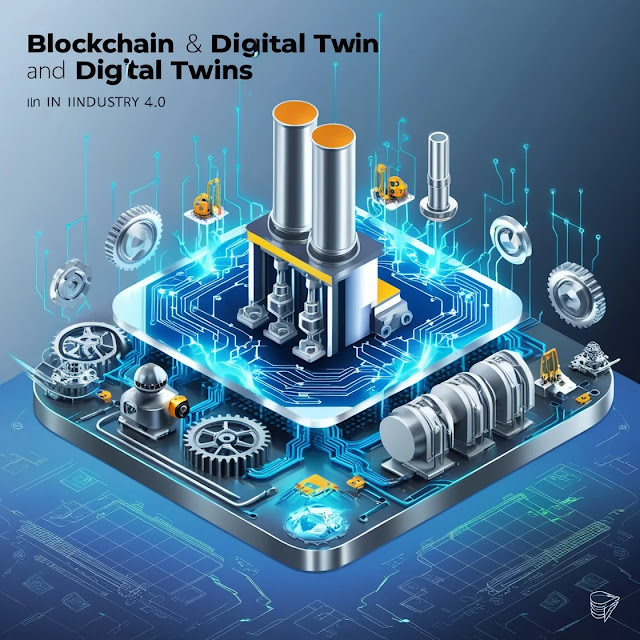Blockchain and Digital Twins: Applications in Industry 4.0
In the era of Industry 4.0, technologies like blockchain and digital twins are at the forefront of innovation, driving transformation in manufacturing, supply chain, and asset management. These technologies work together to provide secure, transparent, and efficient processes. This article delves into how blockchain and digital twins integrate within Industry 4.0 to create a robust digital ecosystem.
 |
| Blockchain and Digital Twins: Applications in Industry 4.0 |
Understanding Blockchain in Industry 4.0
Blockchain technology serves as a decentralized ledger that records transactions across multiple computers. In Industry 4.0, blockchain ensures data integrity, transparency, and security by creating immutable records. These characteristics make it invaluable for sectors requiring precise and tamper-proof records, such as manufacturing and logistics. Blockchain's ability to validate and secure data exchanges helps mitigate risks of data breaches and unauthorized access.
Role of Digital Twins in Industry 4.0
Digital twins are virtual replicas of physical assets, processes, or systems. They enable real-time monitoring and simulation of operations, enhancing decision-making and predictive maintenance. In Industry 4.0, digital twins play a crucial role in optimizing performance, reducing downtime, and improving product quality. By replicating the physical world into a digital format, industries can test scenarios, foresee issues, and make data-driven decisions more effectively.
Integrating Blockchain and Digital Twins
Combining blockchain with digital twins creates a robust framework for secure and transparent data management. Blockchain provides a secure environment for the data generated by digital twins, ensuring that it remains unaltered and accessible only to authorized parties. This integration is essential for maintaining the accuracy of digital twins, as it allows tracking every change or update made to the twin, thereby preserving its integrity.
Applications in Manufacturing
In manufacturing, blockchain and digital twins are used to create smart factories where every machine and process is interconnected. Digital twins provide a real-time view of the production line, while blockchain ensures that all data is accurately recorded and cannot be tampered with. This setup improves quality control, reduces waste, and enhances overall efficiency. For example, digital twins can simulate production scenarios to optimize machine performance, while blockchain secures the data generated during these processes.
Supply Chain Management and Logistics
Supply chain management benefits significantly from the integration of blockchain and digital twins. Digital twins provide a detailed view of the supply chain, allowing for real-time tracking and monitoring of goods. Blockchain adds a layer of security and transparency by recording each transaction and movement of goods in an immutable ledger. This combination helps prevent fraud, ensure product authenticity, and enhance traceability throughout the supply chain.
Enhancing Asset Management and Maintenance
Asset management in Industry 4.0 is streamlined through the use of digital twins and blockchain. Digital twins provide a virtual model of assets, allowing for real-time monitoring and predictive maintenance. Blockchain secures the data generated by these twins, ensuring accurate record-keeping and enabling the automation of maintenance schedules. This approach reduces downtime and extends the lifespan of assets by ensuring they are maintained proactively and efficiently.
Security and Data Integrity in Industry 4.0
Security and data integrity are paramount in Industry 4.0, where the interconnectivity of systems increases the risk of cyberattacks. Blockchain's decentralized nature and cryptographic security make it an ideal solution for protecting the data generated by digital twins. By providing an immutable ledger, blockchain ensures that data is not tampered with, reducing the risk of fraudulent activities and unauthorized access. This level of security is crucial for maintaining trust and ensuring the safe operation of Industry 4.0 environments.
Future Trends and Developments
The integration of blockchain and digital twins in Industry 4.0 is still evolving. Future trends point towards more advanced applications, such as using artificial intelligence (AI) to enhance digital twin simulations and using smart contracts on blockchain for automated transactions. The growing adoption of the Internet of Things (IoT) will also play a significant role, as more devices become connected and capable of generating data that can be managed and secured using blockchain and digital twins.
FAQs: Blockchain and Digital Twins in Industry 4.0
How do blockchain and digital twins improve product quality?
Blockchain and digital twins improve product quality by providing real-time monitoring and simulation of production processes. Digital twins enable manufacturers to identify and address potential issues before they affect the final product. Blockchain ensures that all data related to production is accurately recorded and unalterable, providing a transparent and tamper-proof record of the entire process.
Can blockchain and digital twins work with existing systems?
Yes, blockchain and digital twins can be integrated with existing systems. Many platforms offer APIs and tools that allow seamless integration with current IT infrastructure. This compatibility ensures that industries can adopt these technologies without completely overhauling their existing systems, enabling a smoother transition to Industry 4.0.
What industries can benefit most from blockchain and digital twins?
While manufacturing and supply chain management are the primary beneficiaries, other industries such as healthcare, energy, and automotive can also leverage these technologies. For instance, in healthcare, digital twins can simulate patient conditions and treatment outcomes, while blockchain secures patient data. In the energy sector, digital twins can optimize power grid operations, and blockchain can ensure the security of energy transactions.
Conclusion
Blockchain and digital twins are pivotal in shaping Industry 4.0, offering enhanced security, efficiency, and data integrity. Their integration creates a powerful synergy that transforms manufacturing, supply chain management, and asset maintenance. As these technologies continue to evolve, they will further revolutionize industries, driving us towards a more connected, secure, and efficient digital future.





